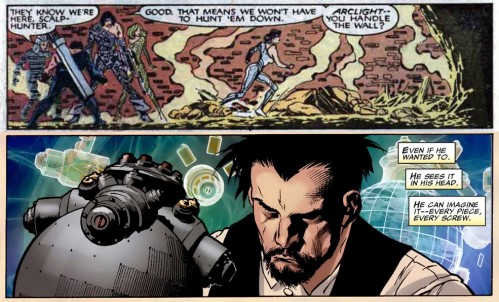Ages ago comic books graced the shelves of newspaper stands across the United States. When I was a child, the local 7-11 had about eighteen shelf-feet of Marvel and DC comics right up front near the cash register to lure young shoppers in the door. The world has moved on, and the comic book publishers and distributors have had trouble keeping up. They switched over from cheap newsprint to glossy high-quality paper, improved their printing techniques, and saw their production costs go through the roof. The $3.99 cover price of Dark Avengers #6 isn’t primarily due to the jet-setting lifestyle of Brian Bendis and Mike Deodato, but rather due to an ailing business model, which has a lot to do with why 7-11 doesn’t stock it. Can Longbox be the answer?
In the late 1980’s and early 90’s, there was an explosion of sorts, a resurgence in the sales of comics. A generation that had hoarded their old issues of G.I. Joe and Batman had jobs now, real disposable income, and were looking to invest in their long-time hobby. They bought up every first-issue of a new title like it was a 1996 tech IPO. The comic companies caught on and sought to exploit this by releasing spin-off titles at alarming rates. They published titles with two, three, even five variant covers, and the comic book mini-bubble snatched them right up. Eventually, like all market bubbles, it burst. Comic book collecting was never a big enough niche for much of the mainstream to have noticed this happening. The market changed, and the publishers had to get a little more modest. A little.
Problem is that once you bump up the quality on a product, it’s a big risk to dial it back. Take a look at a panel from Uncanny X-Men #211 to a panel from Uncanny X-Men #512 above. People who have been buying comics on a regular basis (dwindling demographic that it is) have grown accustomed to the higher quality. Would today’s X-Men subscriber go for the misaligned colors and newsprint again? Even with a significant price cut there would be complaints. Loud complaints from people that the publishers really ought to be listening to: the people that give them money.
So on the assumption that printing on the shiny paper with the fancy presses and distributing through Diamond Comics is reducing the American comic-book market to a small wire rack at the Barnes & Noble and a smattering of specialty shops, something’s gotta give. They probably can’t adopt the model used by Japanese publishers, which boils down to selling large multi-title volumes at aggressively low prices, with very favorable terms for the retailers, with lousy production quality (then sell single-title trade paperbacks for collectors). Your typical Superman subscriber probably doesn’t want an inch-thick block of newsprint with ten pages of the Man of Steel somewhere in the middle, getting ink stains on his fingers when he reads it.
Enter Longbox Digital Comics. Keep the pretty picture quality. Avoid the ink-on-fingers and smudging. Lower printing and distributions costs. All by taking the original artwork, scanning it, and putting it online. There are people already doing this, copying titles within days of their release and getting them out to the Internet for free. This is roughly akin to what happened when folks started ripping their music CDs to .MP3 format and moving them around surreptitiously. From a consumer perspective, piracy has a lot of upside namely in that it’s free. You expend some time to find the content you want, maybe overcome a learning curve or two in getting the technology to work, and then tie up some connection bandwidth you were already paying for anyway. But frankly it’s pretty inconvenient. Until Napster (the old, free, piratey version) the effort that had to go into finding the content was a barrier.
Companies like Apple have learned that it’s possible to compete with free. Folks are willing to spend $0.99 on a music track that they could get free of charge by illicit means. Why? Well mostly because it’s easy. If you have the iTunes player installed on your computer, you’re a couple of mouse-clicks away from most of the music you’re interested in.
Longbox looks to be trying to hedge in on the online comic book piracy market in much the same way. Sign some major players up to populate the library, make a client available for multiple platforms that is easy to get, easy to install, and easy to use for both its primary purpose (reading comics) and its real primary purpose (selling comics), and you’re good-to-go. I foresee a couple of problems along the way:
- First and foremost, to get this to work Longbox needs buy-in from companies that are making comics people are willing to spend money on. This basically means DC and Marvel.
- To bring the existing pirate culture on-board, you’ll want to let the pirates continue to use their ill-gotten content. iTunes lets you play .MP3 files regardless of their origin. A problem I see here is that the widespread .CBR/.CBZ/.CB7 format used by comic scanners lacks a clear-cut means of storing the kind of meta information that something like Longbox will want to use to help its users sort and locate content with. There is no CDDB infrastructure for .CBR files.
- Converting to TPB sales. Comic geeks like books. Paper books they can hold in their hands and put in cardboard boxes and bookshelves in their mothers’ basements. I strongly suspect that getting Marvel or DC to sign up for this new distribution mechanism will rely heavily on convincing them that it will help stanch the market loss caused by existing piracy, not contribute significantly to further piracy, and lead to higher sales in their other existing product lines. So far I’ve seen nothing to indicate that Longbox is aiming to become a mini-Amazon for TPBs or DVDs.
- Goddamned DRM. A lot of people are going to get pissed when the run into the expected three-device limit for shifting their Green Lantern Corps stuff from their desktop to their laptop to their iPhone only to discover that comics are unreadable on such a small screen and trying to bump it over to their Kindle. Or when a more typical user simply upgrades his computer every few years. Eventually he upgrades himself out of a comic book library. Fuck that. Twice. In the ear. But how do you woo existing content owners without DRM? I don’t know.


I would definitely pay $10 a month for 10 titles.
I can probably afford $40 for ten titles, but I am not currently buying them because that’s really like $40 for 200 pages of comic (maybe) and at least 50 pages of ads.
As for DRM, I think that the itunes model of “5 computers, and you can deauthorize one or all of them and then reauthorize 5 other computers” works well. However, I also don’t buy music from iTunes, so I am not the best person to sound off on this sort of thing.
I think there’s a reasonable chance that major publishers of American comic books could expand their subscribership significantly by exploring digital distribution. One benefit of digitial distribution is that there’s no chance of that cute chick at the office catching you on your way out of your local comic store with an armload of geek matériel. For ages now comics have become geekier and geekier while computers and video games have become more and more mainstream. That doesn’t bode well for Marvel and DC, whatever their box office returns may look like.
I think the main thing their box office returns have been showing is that people will pay $10 to eat a shit sandwich for 2 hours several times every year.